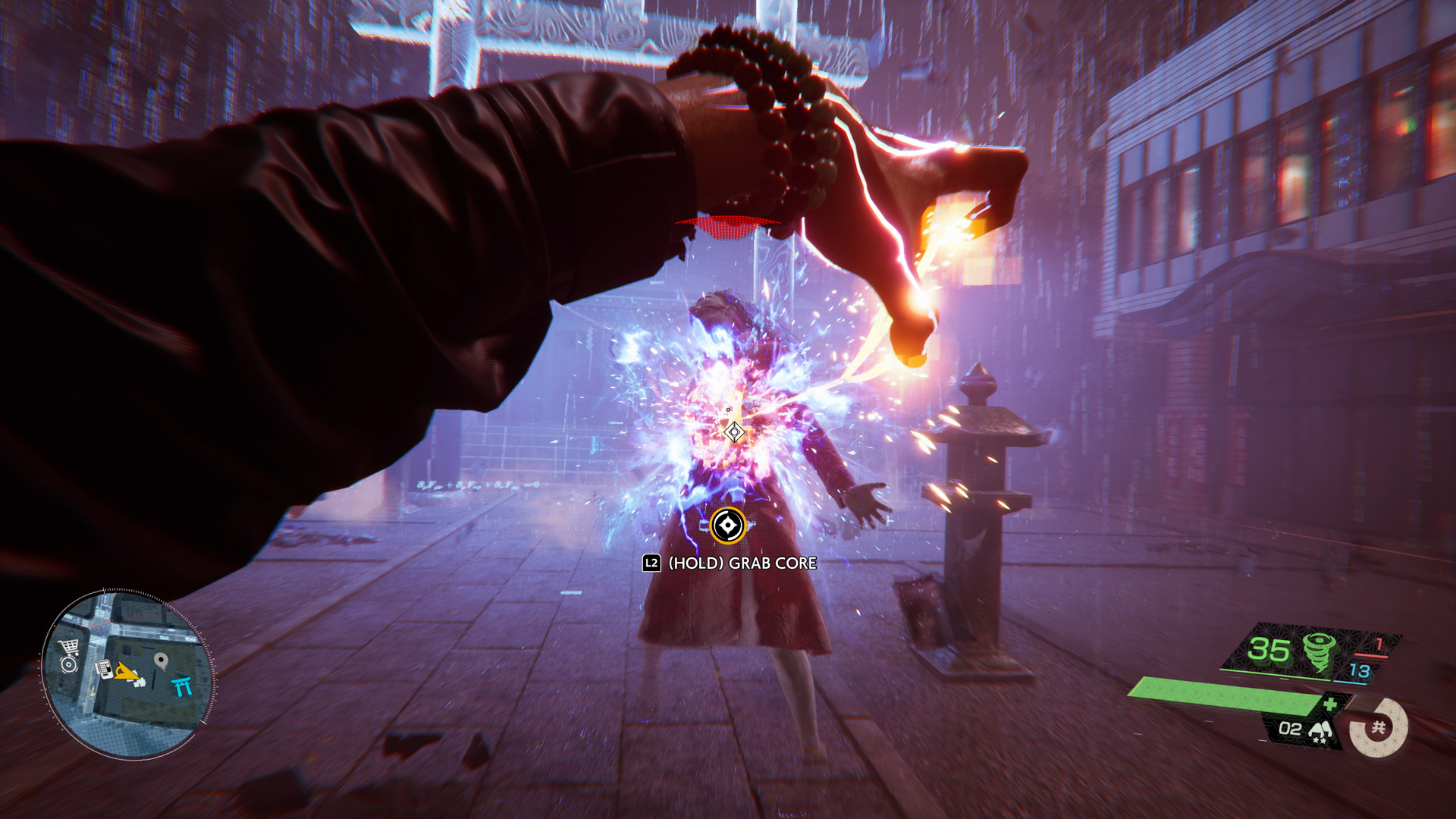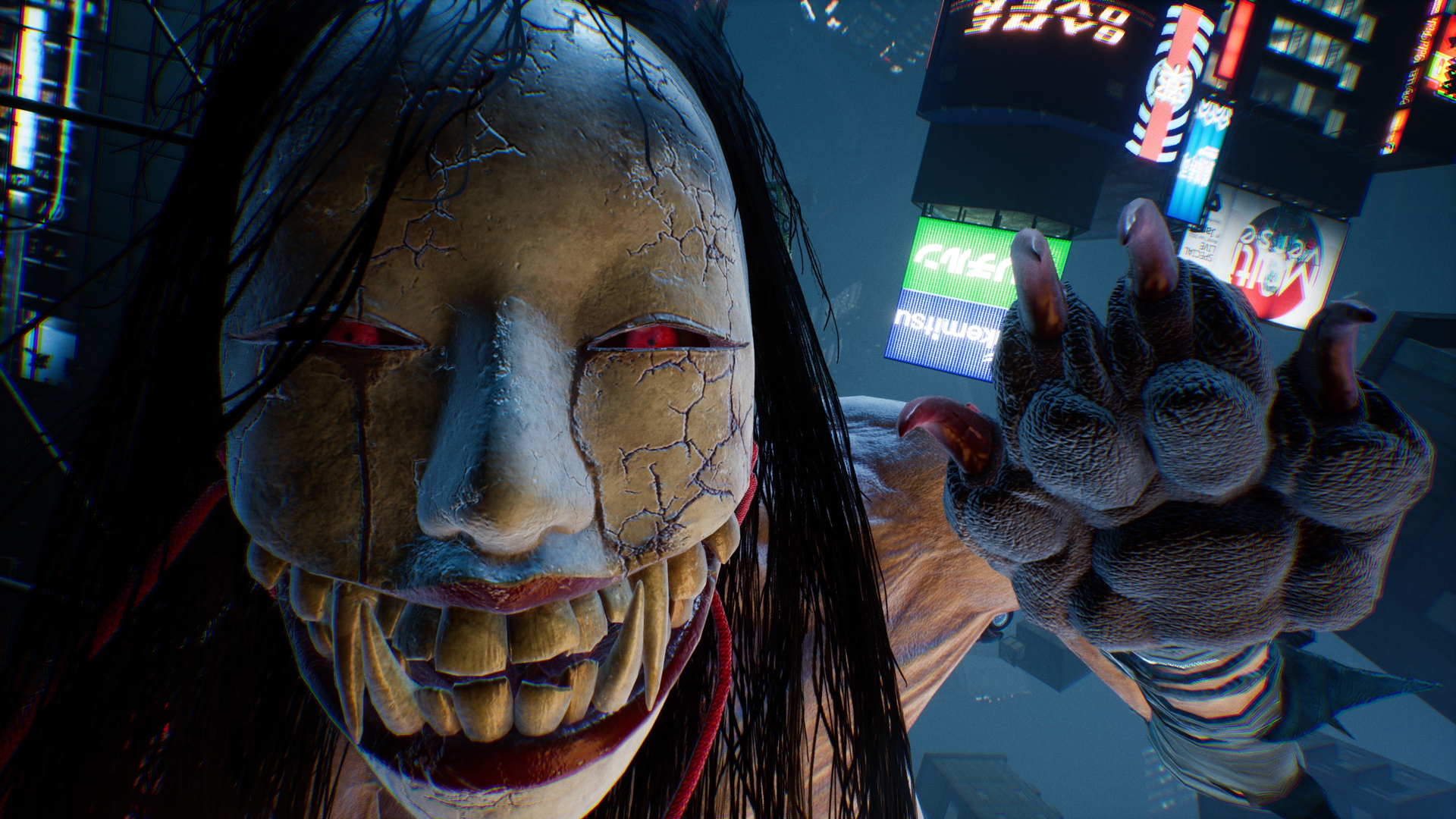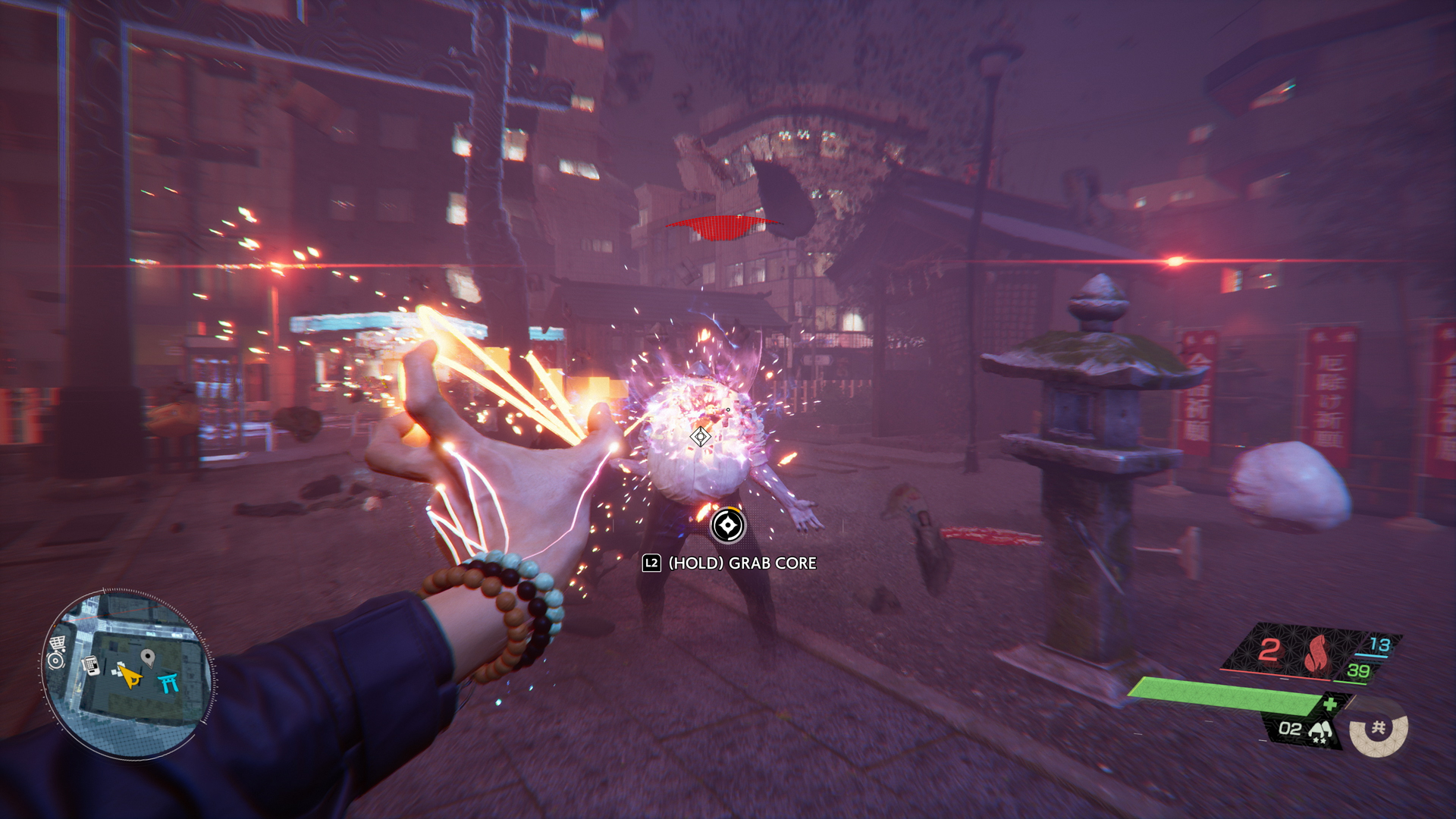GamesRadar+ Verdict
Ghostwire: Tokyo feels like a throwback to a different era of action game design. It takes an off-beat approach to world design, story encounters, and combat pacing that won't be for everyone, but if you can get it to click into place you'll have a resoundingly chill time hunting ghosts throughout Tokyo.
Pros
- +
Unique setup
- +
Gorgeous world
- +
Good vibes
Cons
- -
Shallow combat
- -
Sticky movement
- -
Repetitive cycle
Why you can trust GamesRadar+
Ghostwire: Tokyo will make you appreciate the little things in life. The dopamine hit derived from petting a dog wearing an adorable little bandana. How a sense of all-consuming wanderlust can accumulate as you breathe in the towering beauty of Japan's opulent capital city. That feeling of calm that washes over you as you pray to a Jizo statue for divine protection. And the joy that can be drawn from harvesting hundreds of thousands of lost souls under the warm glow of a hellish Blood Moon. Like I said, the little things.
Developer Tango Gameworks has traded cinematic survival horror for spirited ghost hunting in Ghostwire: Tokyo, the developer's first new IP since The Evil Within had us recoiling against an unraveling reality in 2014. And much like The Evil Within, which was haunted by faint echoes of Resident Evil 4, this rapturous adventure has a lot of recognizable elements that are distorted by the studio's antiquated approach to scenario, combat, and world design.
Bark at the moon


Release date: March 22, 2022
Platform(s): PS5, PC
Developer: Tango Gameworks
Publisher: Bethesda
Ghostwire: Tokyo has this distinctive vibe, as if its origins are rooted in the early 00s. Like it were some undiscovered GameCube-exclusive from Capcom Production Studio 4, lining up alongside the Capcom Five in lieu of Dead Phoenix, or a Clover Studios project that flew so far under the radar that it's only now being given the chance to earn its obligatory cult-classic status. That isn't a commentary on how Ghostwire: Tokyo looks on PS5 (infrequently awe-inspiring with ray-tracing enabled), nor a reflection of how it plays (the frame-rate holds largely steady) or feels in your hands (neat DualSense tricks work to induce immersion); it's simply an acknowledgement that Ghostwire: Tokyo feels like a throwback.
That isn't necessarily a bad thing. I did, after all, spend close to 30 hours trying to absorb all 240,000 lost souls spread throughout Tokyo before triggering the end-game, depositing bundles of spirits into phone booths that are hotwired into the afterlife for reasons that remain unclear. But doing so did allow me to complete the rather rudimentary skill tree that governs Akito's various abilities – or should I say KK's abilities, the spirit detective that's possessing Akito and granting him control over Ethereal Weaving.
Ghostwire: Tokyo is ostensibly a first-person shooter, albeit one where your fingers shoot wind, water, and fire bullets. The combat is uncomplicated and desperately in need of depth, but there's a magic to its presentation and execution that will so easily enrapture your attention. The flashes of light as Akito's fingers contort, the fizz of energy as his wrists shift between shapes beneath hammers of the DualSense triggers – it'll draw you in and let you lean back; saving the world has never felt so undemanding.
However, unlike most modern shooters, the acceleration of your turning circle is slow and full of friction – not all that dissimilar to the system employed in the Resident Evil games Ghostwire's executive producer Shinji Mikami once presided over. There's a stickiness to precise movement that makes Akito's lightning-infused bow effectively useless, and even a lock-on feature can't completely ease the frustration of throwing bursts of magical energy over and around hordes of pursuing enemies – the twisted visions that stalk Tokyo's streets, visitors from another world following a supernatural extinction event.

The combo-less combat, light skill advancement, and slow movement should feel limiting, but it kind of works for what Tango Gameworks has taken aim at here. Enemy encounters always encourage forward momentum; they typically spawn center-screen and are unwilling (or otherwise unable) to push your flanks. Ghostwire: Tokyo is set in an open world, but once combat commences you'd be forgiven for thinking it were on-rails – a great light-gun game that never was, or a Killer7 without all the depravity. There's a charm to it all that's difficult to ignore. A uniqueness to the composition of its disparate elements which makes Ghostwire: Tokyo feel distinctly enjoyable, even as its repetition sets in.
A pervasive sense of good-natured repetition isn't exclusive to the cycle of combat either. Ghostwire is set across an hauntingly beautiful, utterly empty vision of Tokyo. Tango Gameworks uses a narrative hook to empty the city of all but the essentials: dogs to pet, cats for business transactions, enemies to fight, collectibles to hunt, and spirits to meet. Unlike other action games of this style, Ghostwire: Tokyo is cast across a space that feels unburdened by the standards of open world exploration that were set by Grand Theft Auto 3. It's freeing in a sense, stalking the streets of such a densely structured and beautifully scaled cityscape without the burden of constant distraction – there's serenity in its silence, with long stretches of play soundtracked by little more than dogs howling at the blood moon.
Areas of the city open up gradually as you cleanse Torii Gates, a cycle that you'll grow to love and loathe in equal measure. But it's worth doing, not only to push the tightly written story forward but to gain access to surprisingly thoughtful side-quests. Spirits need to be unburdened of past trauma so that they can break on through to the other side, and these short vignettes range from sharp indictments of Japan's workplace culture to off-beat toilet humor. It's playful, as is the way Ghostwire embraces shifting environments and color palettes when it pulls you through more linear levels for key story encounters.
Ghostwire: Tokyo has a really strong sense of 'place'. You'll want to spend time in its world, even if there isn't all that much to do or see in it. Combat is kinetic, but lacks any real sense of progression or power. Enemies are haunting, though lacking the intelligence to really challenge. Akito and KK are good company, even as their adventures against the occult wanes over time. Ghostwire: Tokyo feels like a throwback, and there's an unmistakable pull to its action and presentation. Some of you will long for more depth and variety, but others may just fall in love with the simplicity of hunting souls, convening with spirits, and slinging magic bullets beneath the beautiful Blood Moon of Tokyo.
Ghostwire: Tokyo was reviewed on PS5, with code provided by the publisher.

Josh West is the Editor-in-Chief of GamesRadar+. He has over 15 years experience in online and print journalism, and holds a BA (Hons) in Journalism and Feature Writing. Prior to starting his current position, Josh has served as GR+'s Features Editor and Deputy Editor of games™ magazine, and has freelanced for numerous publications including 3D Artist, Edge magazine, iCreate, Metal Hammer, Play, Retro Gamer, and SFX. Additionally, he has appeared on the BBC and ITV to provide expert comment, written for Scholastic books, edited a book for Hachette, and worked as the Assistant Producer of the Future Games Show. In his spare time, Josh likes to play bass guitar and video games. Years ago, he was in a few movies and TV shows that you've definitely seen but will never be able to spot him in.


